Moby Dick Blu-ray Movie
HomeMoby Dick Blu-ray Movie 
Vivendi Visual Entertainment | 2011 | 184 min | Rated TV-PG | Oct 04, 2011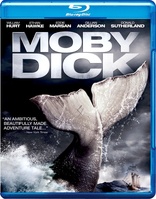
Movie rating
6.5 | / 10 |
Blu-ray rating
| Users | 3.0 | |
| Reviewer | 3.0 | |
| Overall | 3.0 |
Overview
Moby Dick (2011)
Ishmael sees his dream of a whaling voyage come true when he joins the crew of the Pequod, a sailing vessel leaving port in Nantucket. Unbeknownst to Ishmael and the mates, the Pequod s monomaniacal Captain Ahab is taking them all on a mad and personal mission to slay the great whale Moby Dick an obsession that will open their eyes to the wonder and spectacle of man, of beast, and the inescapable nature of both.
Starring: William Hurt, Ethan Hawke, Gillian Anderson, Donald Sutherland, Charlie CoxDirector: Mike Barker (I)
| Drama | Uncertain |
| Adventure | Uncertain |
Specifications
Video
Video codec: VC-1
Video resolution: 1080p
Aspect ratio: 1.78:1
Original aspect ratio: 1.78:1
Audio
English: DTS-HD Master Audio 5.1
Subtitles
English SDH
Discs
50GB Blu-ray Disc
Single disc (1 BD)
Playback
Region A, B (C untested)
Review
Rating summary
| Movie | 3.0 | |
| Video | 3.5 | |
| Audio | 4.5 | |
| Extras | 0.0 | |
| Overall | 3.0 |
Moby Dick Blu-ray Movie Review
Aside from that, how did you enjoy the cruise, Mrs. Ahab?
Reviewed by Jeffrey Kauffman October 3, 2011Has the Great American Novel already been written, or is it still waiting to be delivered, oracle-like, at some distant future date? That question may not rise to the philosophical heights of whether the Messiah arrived over two thousand years ago or is yet to appear, but if you drop by any high school or college level American Literature course, chances are the debate about this very subject will be as animated as any “discussion” between various religious camps about the second subject mentioned above. It’s a fairly regular occurrence in contemporary literary criticism circles to anoint any major new novelistic undertaking with a questioning “Is this the “Great American Novel” we’ve been eagerly awaiting?”, and more often than not within a few months that particular book is forgotten and the scurrying critics have moved on to a new wunderkind. Of course staunch traditionalists simply laugh in derision at all of the hubbub surrounding new releases and simply point back to America’s rather impressive literary pedigree, bringing up any number of novels that have been around for generations as easily filling the figurative shoes of the Great American Novel. Probably no book has eclipsed Moby-Dick (English majors will know the original novel had that hyphen in the name, which was later dropped by most adapters) in sheer numbers of critics and professors inaugurating it as at the very least a major contender for the title of Great American Novel. Herman Melville’s study of obsession and the vagaries of nature (including human nature) has probably been scrutinized, dissected and analyzed more than any other major work of fiction. Filled with allegory, metaphor and virtually every other literary device imaginable, against all odds Moby-Dick also manages to be a riveting adventure story and it has been repeatedly adapted, with various degrees of success, for both film and television. John Huston’s 1956 film starring a perhaps miscast Gregory Peck as Captain Ahab boasted a screenplay by none other than Ray Bradbury and remained surprisingly faithful—perhaps too faithful for 1950s audiences—to the original source novel, and for years it remained the best known version of the story, despite there having been a silent version in 1926 starring John Barrymore which, while not directly adapted from the novel still had several correspondences to it. With the advent of cable television, other Moby Dicks stormed into view, including a generally well regarded 1988 starring Patrick Stewart as Ahab and former Ahab Gregory Peck as Father Mapple. 2010-11 saw competing versions of the story, one with Barry Bostwick as Ahab and the one under discussion in this review, with a rather impressive cast including William Hurt as Ahab, Ethan Hawke as Starbuck, Donald Sutherland as Father Mapple, Charlie Cox as Ishmael, Eddie Marsan as Stubb, Raoul Trujillo as Queequeg and (in a major departure from the novel) Gillian Anderson as Mrs. Ahab, Elisabeth.
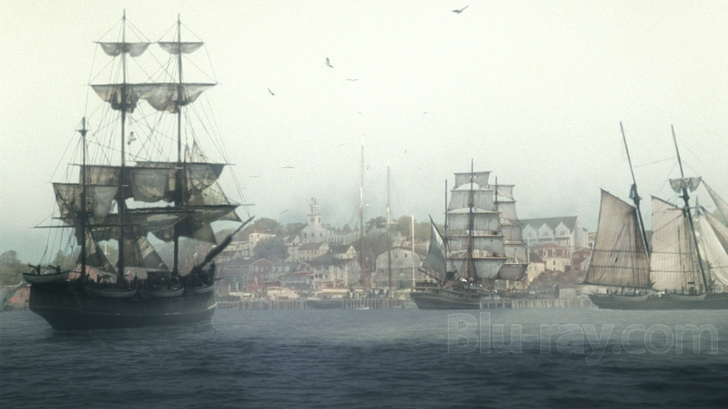
A novel as multi-layered as Melville’s is perhaps bound to fail in a two dimensional screen adaptation (which is not to say a “new, improved” Real 3D version would do any better). The novel is so “thick,” both literally and figuratively, that any screen adaptation must pare the novel down in some way, shape or form in order to make it manageable for the screen. That much is a given, but Melville purists may be under the sway of their own obsession, namely one to draw and quarter scenarist Nigel Williams, who “rethinks” Melville’s magnum opus, inventing new scenes whole cloth, shuffling around the novel’s events and introducing characters that at best were mere sidebars in the original version.
The film begins with Ishmael saving future cabin boy Pip in a scene that may be politically correct in its own dunderheaded way but which is certainly not part of Melville’s original conception. When Ishmael pulls the young boy aboard the back of a wagon, looks at him and states, “Call me Ishmael,” Melville aficionados may be tempted to chuck their remotes squarely through their flatscreen televisions. When the next sequence of the film concentrates on the semi-happy home life of Captain and Mrs. Ahab, who knows how Melville aficionados will react, though chances are it won’t be pretty. Gillian Anderson seems to be playing Mrs. Ahab like Dana Scully having gone undercover and time traveled back to investigate this mysterious story of a mutant sea creature.
Things improve somewhat once we’re aboard the Pequod, and in fact when the film veers away from Ahab it is actually at its best. The early scenes with Ishmael meeting Queequeg and ingratiating himself into the New England whaling community are evocative and very real feeling and the class consciousness both there and aboard the Pequod are very ably represented. The film is oddly skewed more toward Starbuck than Ahab, at least in terms of believability. Hurt’s Ahab is more like a genial if somewhat addle-pated elderly man who just happens to have this one slight obsessive compulsive problem, but who is otherwise a “regular guy.” If Hawke’s Starbuck is, like several other elements in the film, a bit too contemporary for his own good, he nonetheless invests the role with an introspection that is more in tune with Melville’s interior ruminations.
From a visual perspective, this Moby Dick is often a reasonably impressive outing, especially within the confines of made for television features. Director Mike Barker (who did a fine adaptation of Anne Brontë’s The Tenant of Wildfell Hall a few years ago) stages things very well on what appear to be real ships out in real water. While Moby himself is largely CGI generated (though evidently some models may have been used, at least judging by the credits), there’s a fair degree of verisimilitude in the giant whale’s depiction. The final sequence, when Ahab’s madness leads him to a series of disastrous choices, also features some great scenes, and an especially memorable final shot of Ahab and Moby, forever wedded together with a harpoon lash.
Moby Dick Blu-ray Movie, Video Quality 
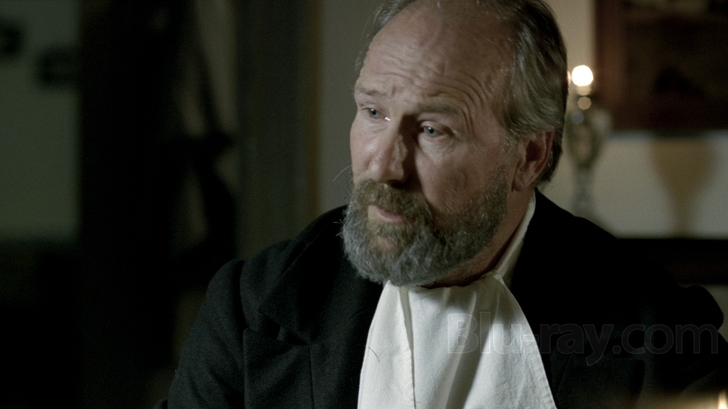
Moby Dick is presented on Blu-ray with a VC-1 encoded 1080p transfer in 2.35:1. This made for television film is intentionally desaturated almost all of the time, with a deliberately filtered image that skew toward the slate grey side of things. This approach robs flesh tones of a lot saturation, and indeed a lot of this film almost looks like a moving daguerreotype, certainly something the filmmakers wanted to achieve. Fine detail is best in close-ups though some of the wide shots also boast impressive levels of depth of field and overall precision. Several of the CGI elements are too smooth for their own good, especially the establishing shots of the Pequod's port and Moby himself. The image's overall clarity and sharpness is not helped by the trendy (and perhaps inappropriate) use of handheld, "jiggly" cameras that frequently make individual moments, especially those at sea, little more than a blur. But when things settle down, the image pops rather nicely, despite its desaturation, with excellent fine detail, decent contrast and generally solid black levels.
Moby Dick Blu-ray Movie, Audio Quality 
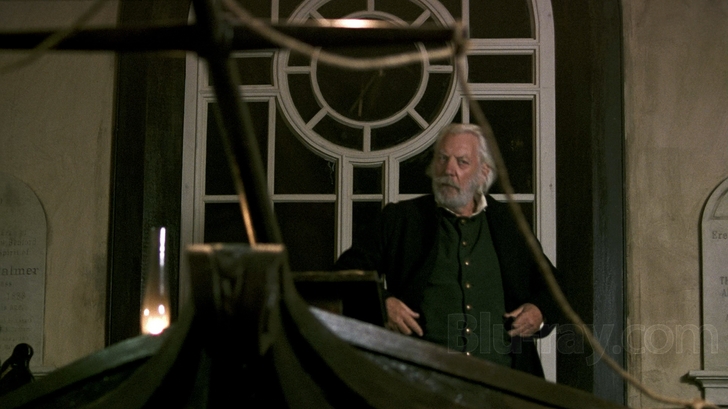
Moby Dick's lossless DTS-HD Master Audio 5.1 comes fully alive once the Pequod takes off on its epic journey, but even before that a couple of group scenes bristle with nice surround activity. The opening hour or so of the movie is spent in introducing characters and is therefore a bit on the quiet side, but once we're on the ship, there's some consistent surround activity courtesy of the omnipresent sounds of the ocean and the men moving about the ship. Fidelity is excellent throughout this track and there's some rather surprisingly wide dynamic range employed over the course of the three hour or so film. Dialogue is clean, though occasionally hard to make out due to some actors' over use of dialects and accents. Sound effects are very well integrated into this film and provide a wealth of immersion (no pun intended, considering the film's watery setting).
Moby Dick Blu-ray Movie, Special Features and Extras 
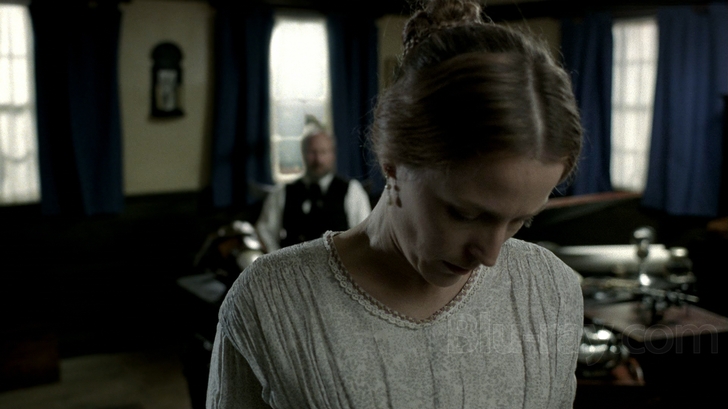
No supplements are included on this Blu-ray.
Moby Dick Blu-ray Movie, Overall Score and Recommendation 
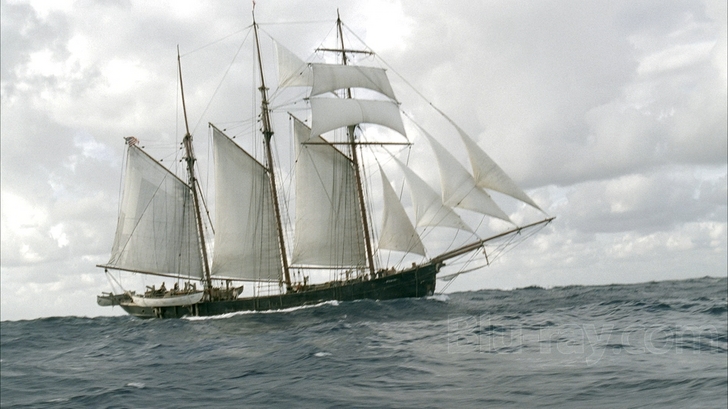
Gregory Peck and John Huston distanced themselves from their 1950s Moby Dick, perhaps realizing that the novel may well be unfilmable. That of course hasn't stopped people from trying. While this version has much to recommend it, notably in some very fine turns in the supporting cast, Hurt has a somewhat bizarre interpretation of Ahab that is on the one hand too likable and on the other hand just too patently weird to ever make a lot of sense. The addition of characters like Mrs. Ahab also adds little to the enterprise and will probably do nothing other than alienate Melville purists. Visually this piece as moments of epic sweep and grandeur, though the nonstop jiggly camerawork combined with the watery setting may have many viewers reaching for the Dramamine. Debate about whether we have yet found our Great American Novel may never in fact be settled, but now we have a new debate to consider: will there ever be a Great American Film Adaptation of one of the greatest novels ever written? Time will tell.
Similar titles
Similar titles you might also like

Men of Honor
2000

White Squall
1996

To the Ends of the Earth
Complete 3 Part Miniseries
2005

Mutiny on the Bounty
Warner Archive Collection
1935

The Life Aquatic with Steve Zissou
2004

The Company Men
2010

Little Fauss and Big Halsy
1970

Seven Years in Tibet
1997

A Passage to India
Collector's Edition
1984

The War Within
2005

To Kill a King
2003

Against All Flags
1952

Mutiny on the Bounty
1962

Tabu: A Story of the South Seas
1931

Frontera
2014

Fire Down Below
1957

In Which We Serve
1942

One Week
2008

How the West Was Won
1962

Noble House
1988